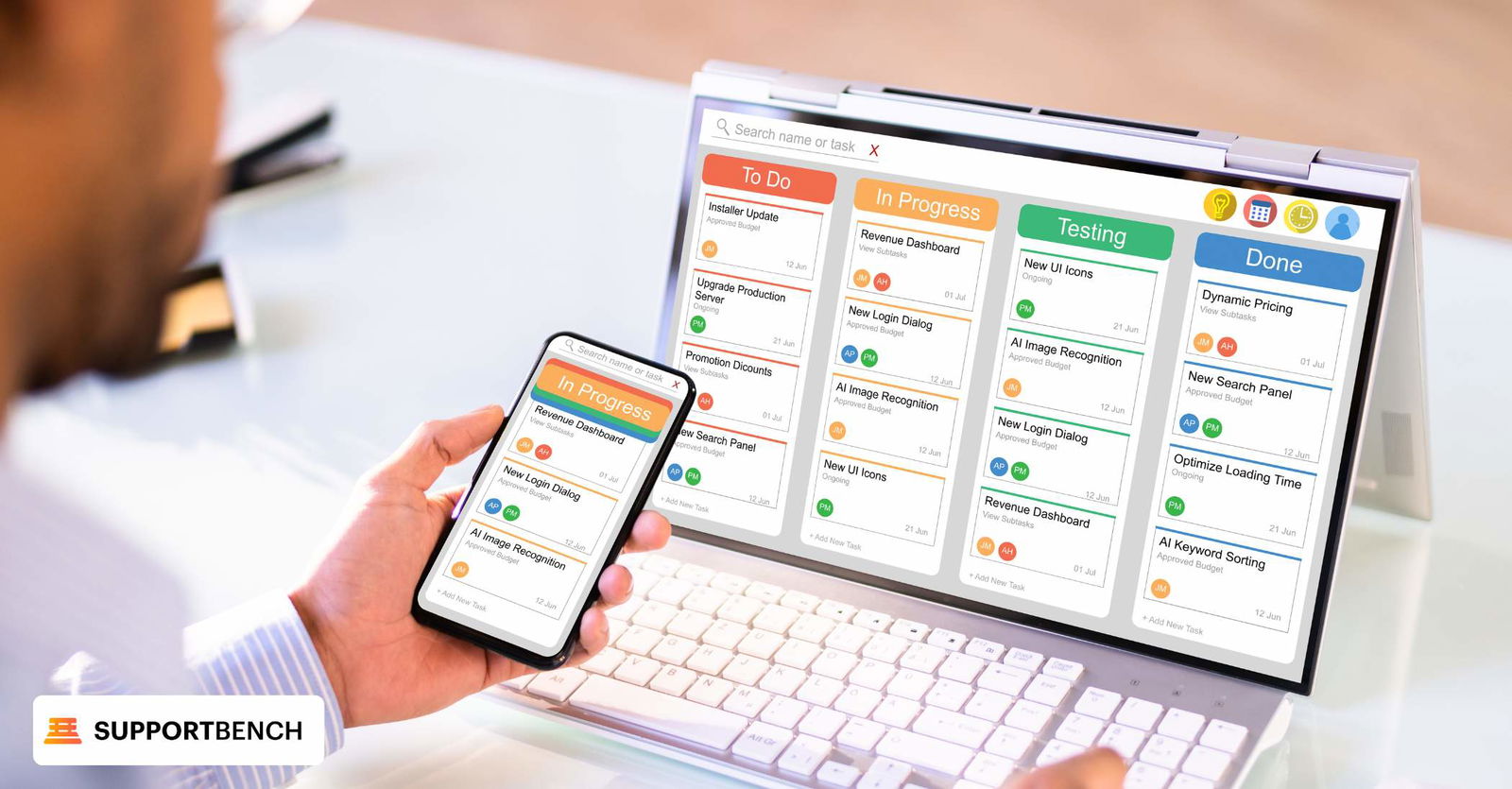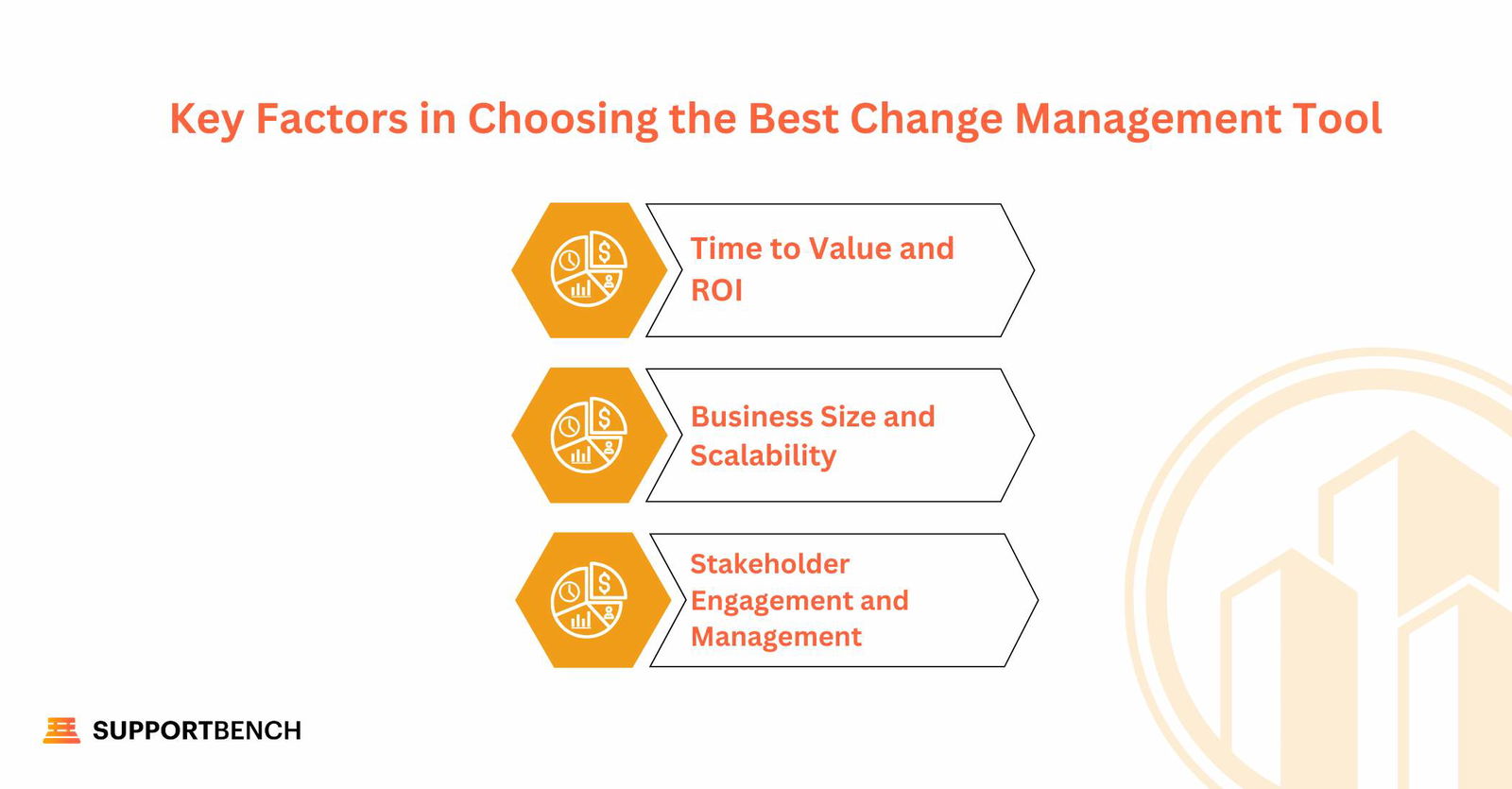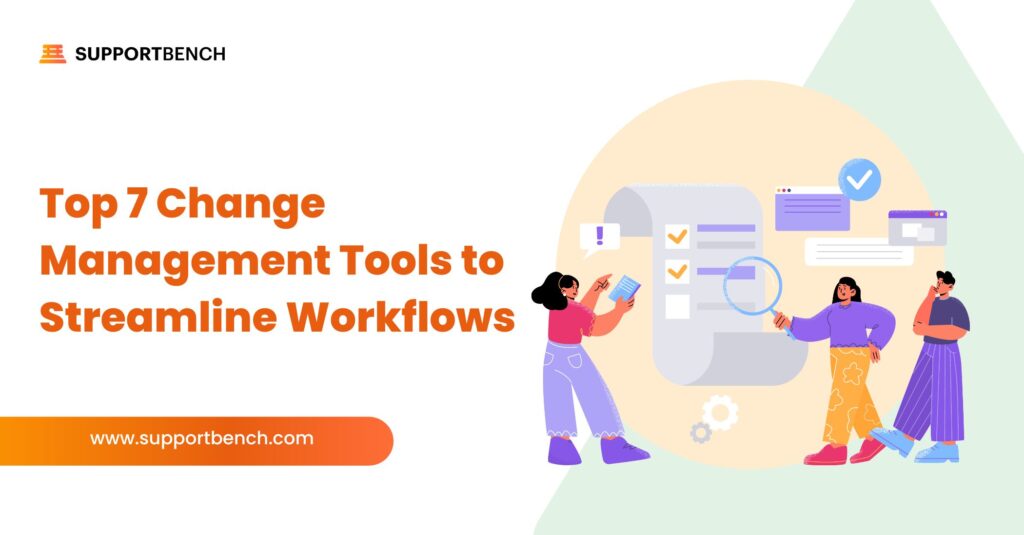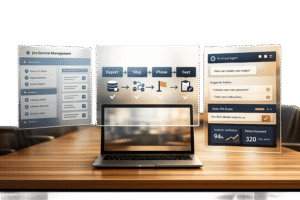Change is inevitable in business. Companies must adapt to new technologies, shifting markets, and evolving customer needs. Change management software streamlines workflows, improves communication, and helps teams navigate transitions smoothly.
In 2025, these tools are advancing with AI insights, workflow automation, and seamless system integration. The right software fosters collaboration, boosts transparency, and keeps businesses competitive in a fast-paced world.

7 Top Change Management Software Tools
In 2025, businesses need change management software that simplifies processes and integrates seamlessly with existing systems. Tools must improve teamwork and handle complex workflows across teams. Below is a list of the best tools, including Supportbench, suitable for businesses of all sizes and industries.
Supportbench
Supportbench offers a robust customer support platform with advanced change management tools. Its features include ticket management, workflow automation, customer portals, and multi-channel communication, making it ideal for organizations navigating change.
These features enable businesses to address customer inquiries, track process changes, and resolve issues quickly, empowering support teams to manage organizational transitions effectively.
Key Features:
- Seamless communication across email, chat, social media, and phone.
- Customizable FAQs and support articles for independent customer support.
- Automated SLA tracking to maintain service quality during changes.
- Automatic escalation rules to minimize delays in critical processes.
- Detailed insights into support performance and customer feedback.
- Automated ticket routing and task assignment for streamlined operations.
- Integration with CRM systems and project management tools.
- Internal notes and team mentions for cross-departmental collaboration.
- Tailored dashboards to track KPIs linked to change management.
- Surveys and sentiment analysis for actionable feedback.
- API integration for customized workflows.
- Role-based access control for sensitive data.
HelpDesk
HelpDesk is a ticketing platform designed to streamline employee requests and improve collaboration. With AI-driven automation and performance tracking, it enhances efficiency and ensures timely responses to repetitive tasks.
Key Features:
- Easy-to-configure AI automation for ticket management and tracking.
- Saved quick responses for faster communication with customers and teams.
- Skill and language-based team assignments for better query handling.
- Integrations with tools like HubSpot, Zapier, and Jira.
Whatfix
Whatfix is an intuitive platform for remote training, onboarding, and managing digital transformations. Its in-app learning tools simplify transitions and help organizations adapt to changes with ease.
Key Features:
- Interactive tips, product tours, and walkthroughs for new systems.
- Self-help menus and videos to reduce IT support dependency.
- Integration with existing workflows to build user skills.
- No-code content creation for interactive guides.
- Accessibility across multiple browsers with features for people with disabilities.
Viima
Viima is a versatile change management platform offering ideation boards to track and manage multiple change processes. Its user-friendly dashboard and feedback tools enhance transparency and engagement.
Key Features:
- Integration with Google G Suite, Microsoft Teams, Office 365, and Jira.
- Tools for commenting, liking, and evaluating ideas.
- Mobile app for image uploads and real-time collaboration.
- Multiple boards for different change initiatives.
WalkMe
WalkMe simplifies software transitions with real-time guidance and step-by-step instructions. It reduces training time while ensuring smooth adaptation to new processes and systems.
Key Features:
- Self-paced onboarding to promote positive behaviours and goal completion.
- Reduced support ticket volumes for greater customer and employee satisfaction.
- Compatibility with platforms like Salesforce, Talentsoft, and Jira.
Giva
Giva is a global platform offering ITIL-based help desk, asset management, and knowledge management solutions. Its reporting and analytics tools provide clear insights into productivity and adaptability.
Key Features:
- Customizable cloud-based change management application.
- No-code configuration with point-and-click tools.
- Advanced reporting to measure team productivity and customer satisfaction.
- HIPAA-compliant mobile app for secure ticket management.
Freshservice
Freshservice is an IT-focused platform that streamlines service and change management. With strong automation features, it saves time and improves team coordination.
Key Features:
- Automated change approvals and notifications.
- Live chat and AI bot integration for real-time communication.
- Flexible views for tracking change progress.
- Tools for scheduling change advisory board meetings.
Choosing the Right Change Management Tool: Key Considerations
Selecting the right change management tool is essential for smooth transitions, minimizing disruptions, and boosting efficiency.
With many tools available, it’s crucial to choose one that aligns with your business needs, supports growth, and optimizes your change management process. Here are some key factors to consider:

Time to Value and ROI
When evaluating change management software, assess how quickly you’ll see benefits post-implementation. Consider these factors to determine potential ROI:
- Is the software ready to use, or does it require significant setup and customization?
- Can your team manage the setup, or will you need a coding expert for ongoing maintenance?
- How much training will your team need? Ensure the vendor offers robust support to accelerate adoption.
By answering these questions, you can better understand the time to value and ensure the tool meets your organization’s operational needs.
Business Size and Scalability
The right change management software should fit your current requirements and adapt as your business grows. Key considerations include:
- Does the software include the features you need now and those you may need in the future?
- Can unnecessary features be turned off to avoid extra costs and improve usability?
- Will the tool handle an increasing number of users and more complex workflows as your business scales?
Choosing scalable software ensures it remains effective as your organization expands.
Stakeholder Engagement and Management
Engaging stakeholders and ensuring transparency in the change process are vital for success. Your software should:
- Make change processes visible, keeping stakeholders informed about progress.
- Be user-friendly for non-IT staff, encouraging participation and fostering a sense of ownership.
- Enhance collaboration with features like real-time messaging and shared dashboards to improve communication and teamwork across the organization.
By prioritizing tools that engage all relevant parties, you can ensure smoother implementation and stronger buy-in.
Conclusion
Selecting the right change management tool is essential for ensuring smooth transitions within your organization. By evaluating your business needs, scalability, customization options, and costs, you can identify a solution that supports both immediate goals and long-term growth.
Platforms like Supportbench simplify workflows, enhance teamwork, and strengthen customer support during periods of change. The right tool keeps your team focused, your customers satisfied, and your change management processes efficient and effective.










